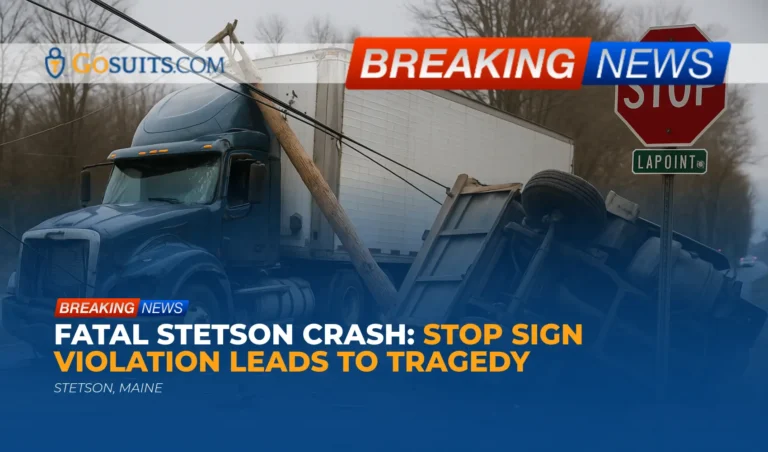A tragic two-vehicle crash in Stetson, Maine, on Wednesday resulted in the death of one driver and serious injuries to another. The incident, which involved a tractor-trailer and a dump truck, underscores the critical importance of adhering to traffic laws and the potentially devastating consequences of negligence on the road.
Incident Details
According to reports, the crash occurred at approximately 1:09 p.m. at the intersection of Lapoint Road and Merrill Road in Stetson. Maine State Police responded to the scene and found a tractor-trailer with a broken utility pole resting on top of it and an overturned dump truck. Both drivers were injured.
Preliminary investigations indicate that the tractor-trailer, driven by a 39-year-old from Denton, Texas, was traveling north on Lapoint Road when the driver allegedly failed to stop at a stop sign at the intersection with Merrill Road. The tractor-trailer then collided with a dump truck traveling east on Merrill Road.
The impact of the collision caused the fully loaded tractor-trailer to strike a utility pole, snapping it and causing it to land on the vehicle. The dump truck, also fully loaded, overturned onto its passenger side.
Victims and Injuries
The driver of the dump truck, a 64-year-old from Glenburn, Maine, died while being transported to the hospital. The driver of the tractor-trailer was transported to Eastern Maine Medical Center with serious injuries.
Investigation and Legal Ramifications
The intersection was closed for several hours while authorities conducted an on-scene investigation and crews worked to clear the roadway. The investigation into the crash is ongoing, and it remains unclear whether the tractor-trailer driver will face charges.
This type of collision often raises significant legal questions and considerations, particularly regarding liability and the rights of the injured parties and the deceased’s family.
Stop Sign Violations and Negligence
Failure to stop at a stop sign is a common traffic violation, but it can have catastrophic consequences. Stop signs are strategically placed to regulate traffic flow and prevent collisions at intersections. When a driver disregards a stop sign, they are essentially failing to yield the right-of-way to other vehicles, significantly increasing the risk of an accident.
In legal terms, failing to obey a stop sign often constitutes negligence. Negligence occurs when a person’s actions (or inactions) fall below the standard of care that a reasonably prudent person would exercise under similar circumstances. In the context of a car accident, a driver who runs a stop sign is likely to be considered negligent because they have breached their duty to operate their vehicle safely and in accordance with traffic laws.

Personal Injury Claims and Wrongful Death
When a traffic collision results in injuries or fatalities, the injured party (or the family of the deceased) may have grounds to pursue a personal injury or wrongful death claim. These claims seek to hold the at-fault party liable for the damages caused by their negligence.
In a personal injury case, the injured party may be able to recover compensation for:
- Medical expenses (past and future)
- Lost wages (past and future)
- Pain and suffering
- Property damage
- Other related losses
In a wrongful death case, the deceased’s family members may be able to recover compensation for:
- Funeral and burial expenses
- Lost income and benefits
- Loss of companionship and support
- Other damages related to the death
Determining Liability
In a crash involving a stop sign violation, determining liability often involves a thorough investigation of the accident scene, witness statements, police reports, and other relevant evidence. The goal is to establish that the at-fault driver’s negligence directly caused the collision and the resulting damages.
Factors that may be considered in determining liability include:
- Whether the driver failed to stop at the stop sign
- Whether the stop sign was clearly visible and properly placed
- Whether the driver was distracted, impaired, or otherwise negligent
- The road conditions and visibility at the time of the crash
Insurance Implications
Car accidents can have complex insurance implications, particularly when serious injuries or fatalities are involved. Both the at-fault driver’s insurance policy and the victim’s own policy may come into play.
In many jurisdictions, drivers are required to carry minimum levels of liability insurance to cover damages they cause in an accident. However, the policy limits may not be sufficient to fully compensate victims for their losses, especially in cases involving severe injuries or death.
Uninsured or underinsured motorist coverage may also be relevant if the at-fault driver is uninsured or has insufficient coverage to pay for the damages. This type of coverage can provide an additional source of compensation for victims and their families.

Commentary from Gosuits Portland, Maine Personal Injury Attorney
This tragic accident serves as a stark reminder of the potential consequences of failing to obey traffic laws, particularly stop signs. The failure to yield the right-of-way can lead to devastating collisions, resulting in serious injuries and even fatalities. From a personal injury perspective, this case highlights the importance of conducting a thorough investigation to determine liability and ensure that all responsible parties are held accountable. The investigation will need to carefully examine the circumstances surrounding the accident, including whether the driver of the tractor-trailer was negligent in failing to stop at the stop sign, and whether any other factors contributed to the crash. Establishing negligence is a critical step in pursuing a personal injury or wrongful death claim. Beyond the immediate legal considerations, this incident also underscores the broader issue of road safety. Drivers have a responsibility to operate their vehicles safely and in compliance with all traffic laws. When drivers fail to do so, the consequences can be catastrophic. It is essential for drivers to remain vigilant, avoid distractions, and always prioritize safety on the road.






